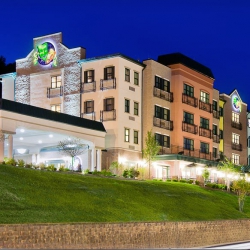Workers in the Mardi Gras Casino in Cross Lanes, West Virginia have voted to strike against their employers. The strike is going to involve nearly 200 casino workers, after the employees voted “Yes” on a strike proposition.
The workers say they plan to strike because the casino’s operators want them to sign over the right to bargain conditions in the future. At the heart of the dispute is the employees’ health benefits. Mardi Gras Casino’s owners want the workers to accept the lowest health benefits legal under federal law.
Striking over Right to Bargain
After weeks of threatening they might walk away from their jobs, the workers held their vote on Friday, September 25. After an affirmative vote, the members of the United Steelworkers Union is set to strike against Mardi Gras Casino. The decision came after the company’s final offer was rejected by the employees. The offer, which was based on amendments to the workers’ employee insurance benefits, was meant to address the main point of contention between the two sides since early August.
The breach did not happen over dollars and cents. Instead, the wording of the collective bargaining is what was at stake. Mardi Gras wanted the union to give away any bargaining power they might have on health benefits.
Asked to Have Minimal Health Benefits
Under the casino’s terms, workers would have had the “lowest insurance coverage allowed by law”. Meanwhile, the premium paid would have increased by 200%. Under the circumstances, the United Steelworkers Union could hardly get worse terms, so they decided they had nothing to lose from striking.
The union had countered with a 50/50 split on the premium increase. That still would have been a 150% increase in the premium for worse benefits, but the union was willing to concede that certain sacrifices had to be made.
Casino Management Refuses Compromise
Casino administrators appeared to be confident they could break the union, because they rejected the offer. One stipulation would have required the casino to split the premium costs when revenues met certain minimum requirements. Even when the casino was profitable enough to make the payments, casino management declined to agree to any such terms.
Several union members gave interviews to WCHS ABC8 News, which made a report on the even of the 25th of September. Kenneth Thomas, a resident of Cross Lanes and a union member for 45 years, said to the reporters that losing the ability to negotiate at a later date was tantamount to breaking up the union altogether, since collective bargaining is the key reason unions form. The idea is that company leaders form into collective units called corporations, so the workers should also be allowed to bargain collectively. Longstanding U.S. laws protect the right of unions to negotiate with their employers.
Mr. Thomas said, “Once you lose that you just may as well be working as an hourly or temporary employee.”
Strike Goes into Effect October 1st
October 1 is when the new insurance policy goes into effect. That is also the date for the union’s threat to strike. Despite Mardi Gras Casino’s slogan “It’s Always a Party”, it doesn’t appear as if any party’s are likely to happen in the West Virginia casino in early October.
Ron Brady, who serves as the president of USW 14614, said that this is no idle threat–that the union members plan to stay out as long as it takes to force a policy change on the Mardi Gras management. Mr. Brady said, “If we have to strike we’ll give our strike notice, we’ll go out, and we’ll stay as long as it takes.”
West Virginia’s Labor History
In the early days of the union movement, West Virginia was a hotbed of trouble. The coal mine workers of West Virginia fought long and hard for better working conditions during the years 1912 to 1936.
At a point, West Virginia’s chapter of the United Mine Workers of America (UMW) made marches in which they wore red bandanas around their necks, acquiring the moniker “rednecks”. During the 1920s and 1930s in the key union states of West Virginia, Kentucky, and Pennsylvania, the term “redneck” came to mean “union worker”.
Over the years, the term has evolved to mean southern working class people, the working poor among whites, or, more pejoratively, southern hillbillies. But one of its original meanings was based on the use of a bandana, which was meant as a symbol of racial unity between Caucasian and African-American mine workers in West Virginia.

